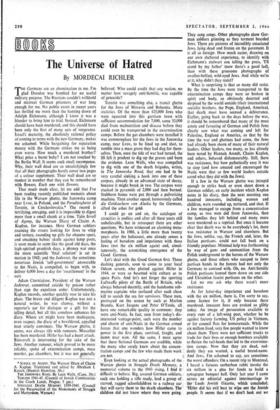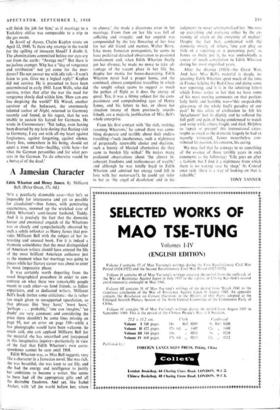The Universe of Hatred
13 K By MORDECAI RICHLER trim Germans are an abomination to me. I'm I glad Dresden was bombed for no useful military purpose. The Russians couldn't withhold and mistreat German prisoners of war long enough for me. No public event in recent years has thrilled me more than the hunting down of Adolph Eichmann, although I know it was a - blunder to bring him to trial. Instead, Eichmann should have been murdered, and this should have been only the first of many acts of vengeance. Israel's maturity, the absolutely rational policy Of coming to terms with the new Germany, makes me ashamed. While bargaining for reparation money with the Germans strikes me as being even worse. How much a murdered brother? What price a burnt baby? I am not touched by the Berlin Wall. It seems such small recompense. Why, their wall dead are so unsatisfyingly few that all their photographs barely cover two pages of a colour supplement. Their wall dead are so modest in number that they can be remembered with flowers. Each one with flowers.
That much made clear, let me add that I've been reading recently published memoirs about life in the Warsaw ghetto, the Janowska camp near Lvov, in Poland, and the Paradiesghetto of Terezin, in Czechoslovakia.* The record is terrifying, enraging, and it is impossible to digest more than a small chunk at a time. Take Scroll of Agony, the Warsaw Diary of Chaim A. Kaplan, for instance. Here German -soldiers roaming the streets looking for Jews to whip and torture, rounding up girls for obscene sport, and smashing babies' skulls against lamp posts, is soon made to seem like the good old days, the high-spirited prankish days, a phoney war once the more scientific 'final solution' is set in motion in 1942; and the Judenrat, the sometimes notorious Jewish 'self-government' answerable to the Nazis, is compelled, to begin with, to deliver 6,000 Jews a day for 'resettlement' in the east Adam Czemiakow, President of the Warsaw ludenrat, committed suicide by poison rather than sign the expulsion order. Unfortunately, Kaplan records, another quickly rose to take his place. The brave and diligent Kaplan was not a natural writer, he was clumsy, without a reporter's ear for dialogue or a gift for the telling detail, but all this somehow enhances his diary. Where art might have been inadequate, even suspect, the diary of a bewildered, appalled man utterly convinces. The Warsaw ghetto, it seems, was always rife with rumours. Mussolini has been murdered. Hitler has had a heart attack. Roosevelt is intervening for the sake of the Jews. Another rumour, which proved to be more reliable, spoke of extermination camp's, mass murder, gas chambers, but it was not generally * SCROLL OF AGONY. The Warsaw Diary Of Chairs A. Kaplan. Translated and edited by Abraham L
Katsch. (Hamish Hamilton, 30s.) .
Tim JANOWSKA Rom). By Leon Wells. (Cape, 30s.) TEREZLN 1941-45. (Council of Jewish Communities in the Czech Lands, Prague, 5 gns.)
STRUGGLE DEATIt MEMORY 1939-1945. (Council for the Preservation of the Monuments of Struggle and Martyrdom, Warsaw.) believed. Who could credit that any nation, no matter how savagely anti-Semitic, was capable' of genocide?
Terezin was something else, a transit ghetto for the Jews of Moravia and Bohemia. More statistics. Of the more than 125,000 Jews Who were squeezed into this garrison town with sufficient accommodation for 7,000, some 33,000 died from malnutrition and disease before they could even be transported to the extermination camps. Before the gas chambers were installed it was commonplace for the Jews in the Janowska camp, near Lvov, to be lined up and shot, to tumble into a mass grave they had dug for them- selves. Then, once the tide of war had turned, the SS felt it prudent to dig up the graves and burn the evidence. Leon Wells, who was compelled to dig with one of the death brigades, writes, in The Janowska Road, that one had to be very careful sinking a hook into one of these corpses, already in an advanced state of decay, because it might break in two. The corpses were stacked in pyramids of 2,000 and then burned. Stubborn bones were put through a pulverising machine. Then another squad, humorously called die Goldsuchern von Alaska by the Germans, sifted the ashes for gold.
I could go on and on, the catalogue of atrocities is endles. s and after all these years still unbelievable, but in retrospect there are other questions. We have witnessed an alarming meta- morphosis. In 1966, a little more than twenty years after the holocaust, one already senses a feeling of boredom and impatience with these Jews (not the six million again) and, simul- taneously, the astonishing emergence of the Good German.
Let's deal with the Good German first. Those dashing generals, soon to come to your local' Odeon screen, who plotted against Hitler in 1944, or were so besotted with culture as to spare Paris. And let's not forget the sporting - Luftwaffe pilots of the Battle of Britain, who always behaved decently, and the handsome sub- marine captains who surfaced after each clean kill to search the sea for survivors. These men, portrayed on the screen by such as Marlon Brando, Kurt Jurgens and Peter O'Toole, all have one remarkable quality in common: they were anti-Nazis. In fact, seen from' today's dis- interested vantage-point, such were the number and charm of anti-Nazis in the German armed forces that one wonders how Hitler came to power in the first place, survived, fought, and damn near won. All the same, I must agree that these fictional Germans are credible, while the many who surely, knew about the concen- tration camps and the few who made them work are not. . ), Even looking at the actual photographs of the Wirsiw ghetto in Struggle Death Memory, a memorial, volume to the 1943 rising, I find it' difficult to believe. Big, assured German soldiers, _1 each 'one holding a rifle ready, lead a group of starved, ragged schoolchildren to a railway car. that will carry them to the death chambers. The children did not know where they were going. They sang songs. Other photographs show Ger- man soldiers grinning as they torment bearded Jews. There are pictures of incredibly emaciated Jews, lying dead and frozen on the pavement It is all so foreign. How much easier, drawing on our own sheltered experience, to identify with Eichmann's stalwart son telling the press, 'I'll stand by my father' (now there's a good lad), than with these gruesome photographs of swollen-bellied, wild-eyed Jews. And while we're at it, Why didn't they resist?
What is surprising is that so many did resist. By the time the Jews were transported to the extermination camps they were so broken in spirit and body, so obviously deserted and despised by the world outside (their international socialist brothers, the Pop-e, England, America), that death _must have seemed a deliverance. Earlier, going back to the days before• the war, it should be remembered that many of the most astute and farseeing of German and Polish Jews clearly saw what was corning and left for Palestine, England or America, so that by the time the war and ghettoes had come, the Jews had alteady been shorn of many of their natural leaders. Other leaders, too many, as has already been noted by Hannah Arendt, Chaim Kaplan, and others,, behaved dishonourably. Still, there was resistance, but how pathetically easy it was to stop (and how amazed and encouraged the Nazis were that so few world leaders outside cared what they did with the Jews).
If a Jew in the Warsaw ghetto Was intrepid enough to strike back or even shoot down a German soldier, an early incident which Kaplan notes in his diary, then the next morning one hundred innocents, including women and children, were rounded up, tortured, and shot. If a Jew managed to escape from a concentration camp, as two men did from Janowska, then the families they left behind and many more were murdered as a reprisal. But once it became clear that death was to be everybody's lot, there was resistance in Warsaw and elsewhere. But the Jews, unlike, say, the French and, later, the Italian partisans, could not fall back on a friendly populace. Minimal help was forthcoming by way of guns and ammunition from the Polish underground to the heroes of the Warsaw ghetto, and those others who escaped to form partisan bands in the forests had not only the Germans to contend with. Oh, no. Anti-Semitic Polish partisans hunted them down on one side and Ukrainian fascist partisans on the other.
Let no one ask why there wasn't more resistance.
As for latter-day impatience and boredom with the six- million, there is, I'm sorry to say, some licence for it, if only because these murdered, innocent Jews are evoked so glibly today. An image of persecution available to every runt of a left-wing poet, whether he be against factory farming, US policy in Vietnam, or for council flats for homosexuals. While the six million lived, very few people wanted to know about them. There were not sufficient trucks to trade for their lives or enough bombers available to flatten the rail-heads that led to the extermina- tion camps. Now that they are dead, sud- denly they are wanted, a useful brand-name. And Jews, I'M ashamed to say, are sometimes the worst offenders: On a recent trip to Montreal, I heard a fatuous surbutban rabbi invoke the six million in a plea for funds to build a synagogue banquet hall. Only last year I came across an editorial against intermarriage in the Leeds Jewish 'Gazette, Which concluded, 'Hitler did his evil 'best to Wipe out the Jewish people. It seems that if we don't look out we will finish the job for him,' as if marriage to a Yorkshire shiksa was comparable to a trip to the gas ovens.
In Scroll of Agony, Chaim Kaplan wrote on April 12, 1940, 'Is there any revenge in the world for the spilling of innocent blood? I doubt it. The abominations committed before our eyes cry out from the earth: "Avenge me!" But there is no jealous avenger. Why has a "day of vengeance and retribution" not yet come for the mur- derers? Do not answer me with idle talk—I won't listen to you. Give me a logical reply!' Kaplan did not survive. He is presumed to have been exterminated in early 1943. Leon Wells, who did survive, writes that after the war the need for vengeance slowly died within him. 'How can one live despising the world?' Eli Wiesel, another survivor of the holocaust, the enormously talented author of Night, returned to Germany recently and found, to his regret, that he was unable to sustain his hatred for Germans. He wrote in Commentary: 'Yet today, even having been deserted by my hate during that fleeting visit to Germany, I cry out with all my heart against forgiveness, against forgetting, against silence. Every Jew, somewhere in his being, should set apart, a zone of- hate—healthy, virile hate—for what the German personifies and for what per- sists in the German. To do otherwise would be a betrayal of the dead.'































 Previous page
Previous page